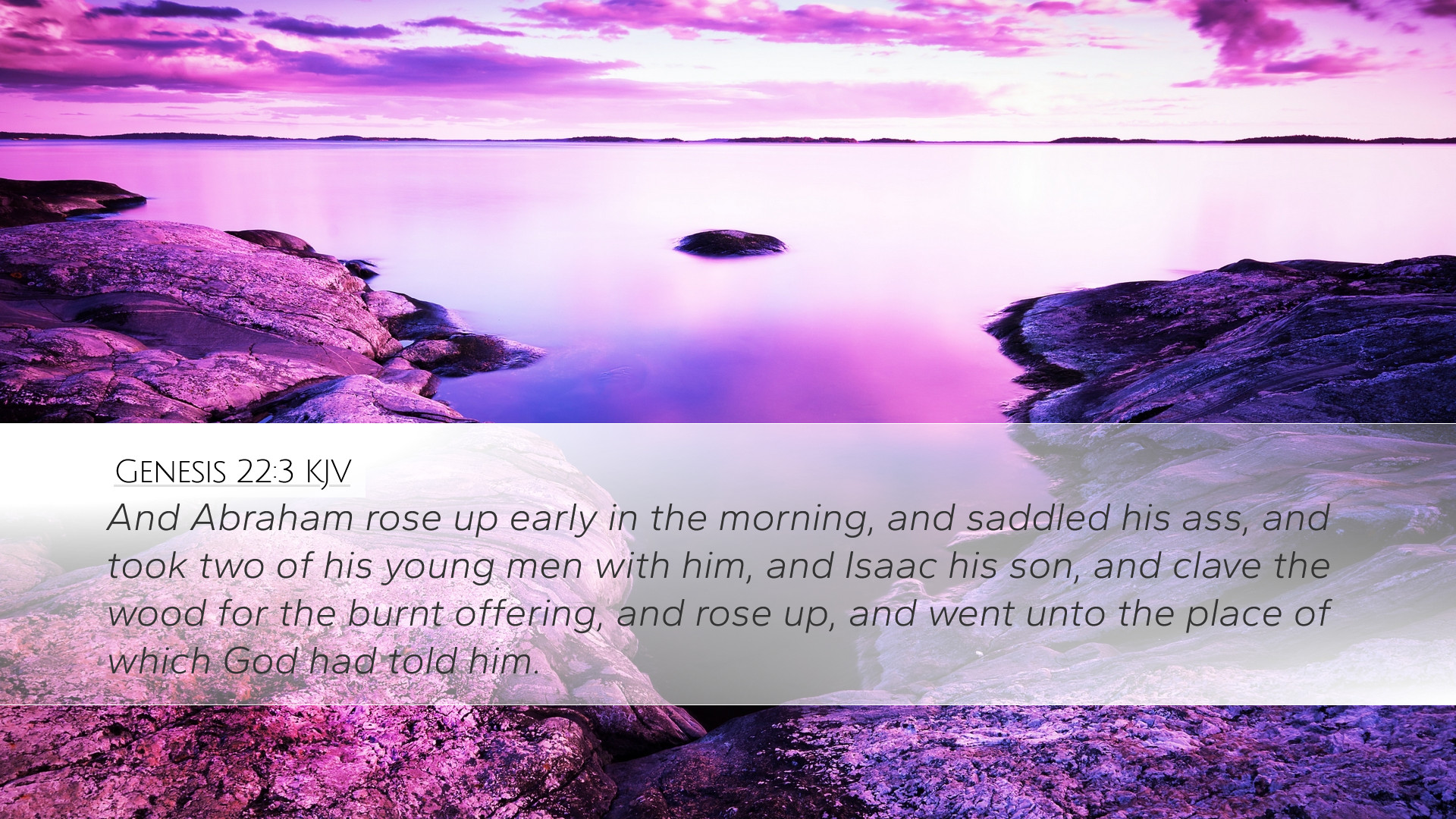Commentary on Genesis 22:3
Genesis 22:3 records a pivotal moment in the narrative of Abraham's faith and obedience to God: "So Abraham rose early in the morning, saddled his donkey, and took two of his young men with him, and Isaac his son; and he split the wood for the burnt offering, and arose and went to the place of which God had told him." This verse serves as a profound backdrop for understanding the themes of obedience, sacrifice, and divine testing that permeate the entirety of Scripture.
Contextual Overview
To appreciate the depth of this verse, one must consider its placement within the broader narrative of Genesis. This chapter recounts the testing of Abraham's faith when God commands him to offer his son Isaac as a burnt offering. This command raises profound theological and ethical questions that resonate through the ages.
Insights from Commentaries
Matthew Henry's Commentary
Matthew Henry expresses that Abraham’s immediate response encapsulates the essence of faith's obedience. Henry notes that Abraham did not delay, but rather "rose early in the morning," indicating a devout commitment to fulfilling God’s command without hesitation. This highlights the virtue of being prompt in serving God, a lesson for believers in every generation.
Albert Barnes' Notes on the Bible
Barnes emphasizes the readiness and determination of Abraham. He points out that the act of saddling his donkey and preparing for the journey illustrates a deliberate resolve to adhere to God's will. Barnes comments that this preparation symbolizes Abraham’s acceptance of the task at hand, suggesting he did not waver in his trust despite the nature of the command.
Adam Clarke's Commentary
Adam Clarke elaborates on the importance of the companions Abraham took with him, highlighting that they represent the community of faith and support in carrying out God’s directives. Clarke notes that while Abraham is headstrong in his obedience, the presence of those two young men illustrates the genuine nature of communal faith, even in the most personal of trials.
Theological Reflection
This event is much more than a historical account; it serves as a theological cornerstone for understanding God's covenant with Abraham and the foreshadowing of Christ’s ultimate sacrifice. Abraham’s unflinching obedience is a typological representation of the Father’s own willingness to sacrifice His Son for humanity's redemption.
Key Themes
-
Obedience:
Abraham's immediate action in Genesis 22:3 manifests the principle of obedience. His readiness to obey without questioning reflects a profound trust in God's plans and purposes.
-
Faith Tested:
This moment serves as a test of faith, a scenario where believers are called to maintain faith even in the face of overwhelming challenges.
-
The Nature of Sacrifice:
Abraham's willing to sacrifice Isaac introduces the theme of sacrificial love, pivotal in understanding the nature of God and His covenant.
Practical Applications
For pastors, theologians, and students of the Bible, Genesis 22:3 challenges one to consider personal responses to God's call. It raises essential questions regarding:
-
How do we respond to divine directives?
-
Are we prepared to sacrifice for our faith?
-
What does true obedience look like in our contemporary context?
In conclusion, Genesis 22:3 encapsulates a moment of profound significance that speaks to the heart of the relationship between God and humanity. The insights gleaned from the commentaries emphasize the importance of faith, obedience, and the willingness to sacrifice, foundational truths that resonate throughout Scripture and challenge us as followers of Christ.


